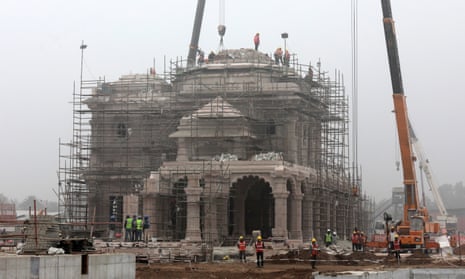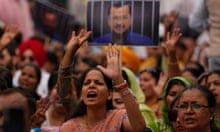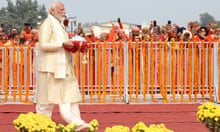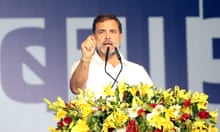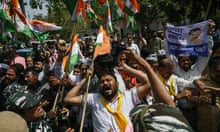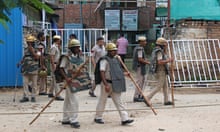Amid the deafening roar of construction and exuberant cries of visiting devotees, the outlines of India’s largest Hindu temple are gradually emerging.
For now, Ram Mandir, in the holy town of Ayodhya, is only half built. The grand pillars, vast domes stretching 49 metres (161ft) high, and elaborate gateways and carvings that will eventually form the final architecture of this much-anticipated temple have all yet to be completed; instead it remains largely a building site, filled with dust, bulldozers, scaffolding and high fences to prevent intruders.
Yet, even in its half-formed state this temple has taken on a significance unrivalled by any other religious structure in India. Next week, on 22 January, the prime minister, Narendra Modi, will take part in the inauguration of the Ram Mandir, when an idol of Lord Ram, a Hindu deity, will be placed in the temple’s inner sanctum.
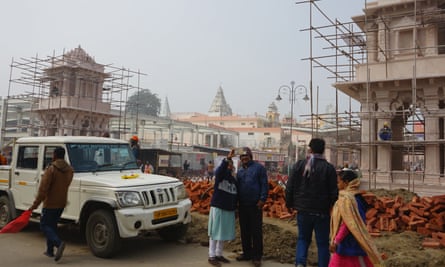
“This will be our Vatican City, the holiest site for Hindus across the world,” said Sharad Sharma, spokesperson for Vishva Hindu Parishad (VHP), a rightwing Hindu group, and member of the Hindu trust building the temple. “After 500 years of Hindu oppression, Lord Ram will finally be returned to Ayodhya.”
Ram Mandir is being built on the site that many Hindus believe to be the birthplace of Ram. It is also where a mosque, Babri Masjid, stood for hundreds of years before being torn down by a Hindu rightwing mob in 1992 after decades of disputes. The demolition, which set off riots that killed thousands, is still regarded by many as one of the most seismic acts of religious violence in independent India.
In 2019 the supreme court ruled that the site belonged to Hindus, in a victory for Modi and the ruling Hindu nationalist Bharatiya Janata party (BJP), which had long pledged to build a temple there.
A divine moment, or political ‘gimmick’?
By April, India is due to go to elections in which Modi and his BJP government will be seeking a third term in power. The temple inauguration, where Modi will be leading the ceremonies alongside the priests, has been described by some analysts as the unofficial launch of his election campaign. The BJP’s election agenda is likely to draw heavily on religious sentiments of Hindus, who make up 80% of India’s population.
Modi’s own religious devotion around the ceremony has been publicly pronounced, with the prime minister declaring that God had chosen him as an instrument to be “representative of all Indians” and he had begun 11 days of “strict vows and sacrifice” to prepare for the event.
The government’s close alignment with Ram Mandir has been seen as symptomatic of India’s movement away from the secularism enshrined in the post-independence constitution and towards the establishment of the country as a Hindu Rastra [Hindu nation] since the BJP came to power in 2014.
The leaders of India’s opposition parties have called the inauguration a gimmick and a political project and turned down invitations to attend, leading the BJP to accuse them of being “anti-Hindu”. Several senior Hindu priests and heads of major shrines have also refused to attend the event, on the grounds that consecrating an unfinished temple undermines scripture.

The BJP and its allies have been on a feverish push to ensure that the inauguration is seen as a national, and even international, event akin to a religious festival. About 8,000 people have been officially invited but more than 100,000 people are expected to flock to Ayodhya on the day. Screenings will be held across the country, as well as at Indian embassies across the world and even on a sponsored screen at Times Square in New York.
The Rashtriya Swayamsevak Sangh, the Hindu nationalist paramilitary organisation that birthed the BJP, has taken a prominent role in the outreach by distributing small food packets with a pamphlet on how to take part in the celebrations to more than 50m households.
Donations for the temple – which will eventually be the third largest in the world – have now exceeded 4tn rupees (£38bn), according to the trust that is building it.
Thousands of gifts have also been rolling in, including fruit baskets from Nepal and the world’s largest incense stick, created by a farmer in Gujarat. The stick, 33 metres (108ft) long and made from 1,470kg of cow dung, 190kg of ghee and 420kg of herbs, is expected to burn for a month and a half once lit.
According to doctors in a hospital in Uttar Pradesh, dozens of pregnant women have requested their caesarean sections to take place on 22 January, so their child could be born on the auspicious day of the consecration.
In the days building up to the ceremony, Ayodhya, once sleepy and rundown, has been transformed into a thriving, hectic town, with construction on every corner. Devotees have flocked from across the country to catch a distant glimpse of Ram Mandir through metal barriers.
Lallalal Yadav, 60, said this was his third time visiting and his whole village would be travelling more than 500km from the state of Madhya Pradesh for the inauguration. “This is the most important place for me in my whole life,” he said. “It’s very emotional for me to see the temple being built and to know that Lord Ram will be restored to where he belongs. All Hindus will be celebrating.”
‘Every day the situation for Muslims gets worse’
For the Muslims of Ayodhya, it has been a markedly different story since the supreme court’s 2019 verdict. In contrast to the speed of the Ram Mandir construction, work on rebuilding the demolished mosque has not yet begun.
Instead of the “prominent” spot that the supreme court ruled that Muslims should be given as a replacement, the state government allotted Muslims a piece of land 25km away; a desolate patch far from the city centre, surrounded mostly by a highway and agricultural fields and far from most local worshippers. The space initially allocated was not big enough for the project and there have been delays in obtaining government and safety permissions.
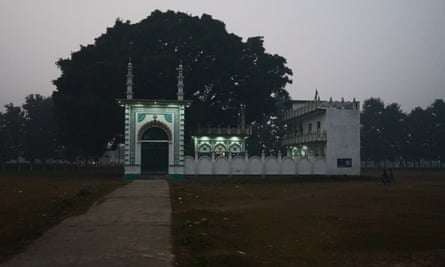
“The government are not showing any willingness or support for the mosque construction,” said Mohammad Azam Qadri, president of the local Muslim body, whose grandfather had been a petitioner on the Muslim side in the Ayodhya legal case.
Qadri said harassment and persecution of Muslims had escalated since 2019, driving many families out of the town, and that there had been land grabs of Muslim graveyards and land. Last year, police arrested a group of seven local Hindu men for allegedly throwing pork, abusive letters, and torn pieces of Islamic text at several mosques in Ayodhya.
“Despite all the injustices, we just wanted to move on and for there to be peace,” said Qadri. “But even as we stay quiet, every day the situation for Muslims in Ayodhya gets worse and worse. They pulled down our mosque, now they will not stop till there are no Muslims left here.”
